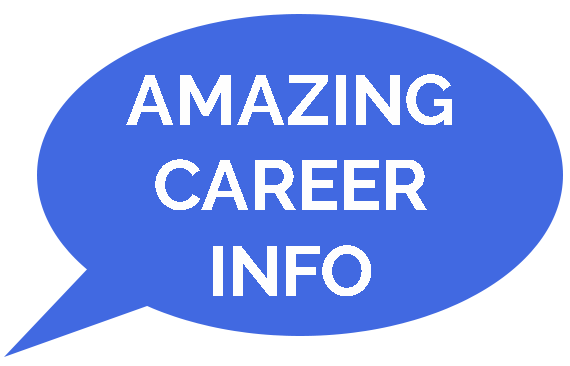Action Learning At Work – Key Ideas
By Dr Charles Margerison
Psychologist
A Process For Professional Development
Dr Reg Revans, the Doyen of Action Learning, said that if we study what we do at work, we can seriously improve:
- Our careers
- The job we do
- The way our organization works
- The service we give to clients and colleagues
He invented the term “action learning” as a way of doing this. It sounds simple. You take action, and you learn. But, there is a lot more to it than that. If you really want to improve your performance, then the following pages can help. They outline not only the ideas of Reg Revans in brief, but other key philosophers and thinkers who have contributed to the study of action and learning.
You can then follow up the details if the main ideas interest you.
We shall start with the main points from the life and work of Dr Reg Revans, based on my memories of him.
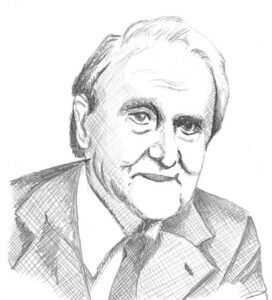
Dr Reg Revans (1907 – 2003)
The Doyen of Action Learning
It was a privilege to know Reg Revans, and I learned a lot from him. He was the champion for continuing professional development, by work-based action learning. These are some of my personal recollections of his work and career, based on the discussions we had, his workshop presentations and his written work. He was an extraordinary man, by any standard.
Born in 1907, he trained as a scientist. Early in his career, he worked in organizations with the great names of his day, including Einstein, and those at the Cambridge Cavendish Laboratory. He was also an accomplished athlete, and represented England at the 1928 Olympics, in Amsterdam. He then established a career in public education in Essex, and subsequently in industry. He was a Director of Education for the National Coal Board (NCB) after the end of the Second World War. Later, he became the first Professor of Industrial Management, at the University of Manchester Institute of Science and Technology. Following that, he was an independent, action learning adviser.
In 1945, the problems that he and his colleagues faced at the NCB were enormous. Reg Revans said that there were so few people available to manage and work the mines, due to the losses during the war years. He added that it was not appropriate for those who returned, to be off the job attending courses. Therefore, he adopted a system he had seen in the research laboratories, where colleagues shared and compared their problems, ideas, and findings, at the workplace.
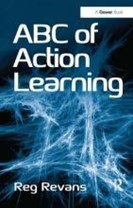 He invited the managers of coalmines to do likewise, by visiting each other’s mines, usually in small groups, which he called “a Set” of managers. One of the managers could be managing safety arrangements very well. If so, he was asked to share his methods. Another one might be doing well on productivity and teamwork. Another manager might be controlling costs well. By their visits and discussions to each other’s mines, they learned the best practice. In addition, they also had mutual support and confidence from each other, to introduce the new methods to their own mines.
He invited the managers of coalmines to do likewise, by visiting each other’s mines, usually in small groups, which he called “a Set” of managers. One of the managers could be managing safety arrangements very well. If so, he was asked to share his methods. Another one might be doing well on productivity and teamwork. Another manager might be controlling costs well. By their visits and discussions to each other’s mines, they learned the best practice. In addition, they also had mutual support and confidence from each other, to introduce the new methods to their own mines.
Reg Revans called this “Action Learning”. It sounded simple enough but, to his dismay, he found most of the training profession and academics, going in the opposite direction. The professional trainers and professors wanted to control the agenda with standard courses. Revans wanted to let the managers lead and take responsibility for both the action and the learning, based on their issues. Action learning was for active people who wanted to share and learn.
Reg Revans, for the most part, was therefore critical of passive training, where people sat in classrooms listening to lectures, and doing old case studies of a time long past. However, he recognized that if a solution to a problem was already known, then “programmed knowledge”, as he called it, was relevant. This could be gained from a book, or lecture, or today, via the internet. But, for real work problems, where there could be various options and no easy answers, it was best to research the action, and help people learn from what they were doing. This, he said, was the difference between puzzle type teaching, and problem centred learning.
Revans Action Learning Formula
L = P + Q
where L is learning, P is programmed knowledge and Q is questioning to create insights into what people see, hear or feel.
Q uses :
“closed” questions:
who?
what?
“objective” questions:
how much or how many?
“relative” questions:
where
when
“open” questions
why?
how?
Initial Meeting
My initial meeting with Reg Revans was in Belgium, in the early 1970s. I was working at the European Foundation for Management Education for three months, assessing different approaches to management development in various countries. A colleague said there was an Englishman, by the name of Professor Revans, in an office nearby, who was advising the Belgium Government. I contacted him. He invited me round, and gave me a warm welcome.
He outlined his ideas for getting managers together to study what they did at work. He said his ideas had not found favour in UK universities. So, at an age, when others were retiring, he had accepted the challenge of establishing action learning, with a consortium of Belgian companies.
I was about 33 years of age, and he was in his sixties. I was part of the new business school breed. He was the school of hard knocks, plus intellectual understanding. Mine was the world of book learning, with little tested in practice. His was the world of action, and explaining most of it after the event. Mine was the world of ideas and methods, in search of problems. His was the world of real problems, in search of wisdom and mutual assistance.
I had a lot to learn, but it was hard to take off the conventional glasses and see things from the ground upwards. I still wonder why I did not immediately get involved with action learning. The problem was that I was too well educated. I had been conditioned that in order to learn something properly, one had to be taught. Reg asked the question of why that was so.
In Brussels, he outlined in an eloquent philosophical way, his ideas. He was determined to show that action learning was the way to go. He proposed that advisers should not be experts, but act as facilitators, to enable managers to learn from each other’s experience. I left feeling that everything he said made sense. However, it was totally at odds with the world of formal education in which I worked, and what I observed on my travels round Europe.
Should I join his radical anti-establishment camp? Or, should I continue under the “teaching first” and “learning second” model of the business school? With a wife and three children to support, and not understanding how to make his ideas work, I returned to the safety of my salaried job. I took the secure economic path, rather than the radical and relevant, action learning education path. However, I had not forgotten what he said.

“The Revans Way”, as I now call it, starts with the political and economic realities of the business issues, and how they affect a person’s work, rather than start with an academic course. He focused on asking question about the outputs first, and then looked for educational inputs. I was working in a system that said, start with teaching inputs and one day; people may be able to use it. He was focusing on the “here and now”, leading to immediate and future applications. I was focusing on inputs that may be relevant sometime, and somewhere, but not today. It was the contrast of the specific action learning model and the general teaching model. They were miles apart, and I felt somewhere in between, as a result of experience.
A reason for this was that a couple of years before I met Reg Revans, I was asked by the Shell Oil Company to be a consultant at one of their refineries. The Company invested a lot of money in training. They had tried the conventional lectures, cases, role plays and experiential problem solving exercises, with little impact on costs, projects, or productivity. They asked me to meet with a group of engineering and other managers, for two days, at a conference centre. My job was to facilitate discussions on the issues they felt were important, and find ways of making improvements.
There was no formal course with lectures, only the sharing of experience. Starting with a white sheet of paper, we composed an agenda from the problems and concerns that each person posed. They were “comrades in adversity”, as Revans was fond of saying. All the managers felt it was a great success, and they followed up by organizing their own informal meetings.
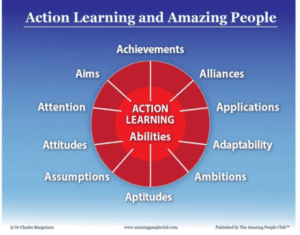 I had stumbled into action learning without realizing. I knew it was different, for during those two days there was an intensity of purpose, and genuine attempts by participants to help each other. There was also the magic of esprit de corps in the air. We left the event, with a resolution to continue assisting each other and make things happen. However, I did not feel I could go to other organizations and say, “I do not have any course or agenda, but if you give me a group of managers for two days, we will be able to sort some major problems out and get results”. It all seemed like smoke and mirrors, and “selling thin air”. But, I did not forget the experience, and looked for similar opportunities.
I had stumbled into action learning without realizing. I knew it was different, for during those two days there was an intensity of purpose, and genuine attempts by participants to help each other. There was also the magic of esprit de corps in the air. We left the event, with a resolution to continue assisting each other and make things happen. However, I did not feel I could go to other organizations and say, “I do not have any course or agenda, but if you give me a group of managers for two days, we will be able to sort some major problems out and get results”. It all seemed like smoke and mirrors, and “selling thin air”. But, I did not forget the experience, and looked for similar opportunities.
Revans and Action Learning Applications
First Phase
Prior to Brussels, Reg Revans had worked with the National Health Service, as an adviser. He introduced a range of challenging processes that brought doctors, nurses and administrators to work in the same project groups. This was indeed a breakthrough, in a health service, where a caste system of a kind prevented real communication to resolve many problems affecting patients. Independent research, later showed, that in those hospitals where the “Revans Way of action learning” was applied, there were a number of clear improvements. These included reducing the number of days in hospital per patient, in comparison to other hospitals that had not used action learning.
Revans also worked, as a consultant with industrial and commercial organizations. He was asked by Sir Arnold Weinstock, Head of the GEC Company, to introduce action learning in his organization. Again, he rose to the challenge with great success. He brought managers from different parts of that giant business together to ask questions, find the facts, assess options, make choices, implement decisions and share their learning.
It sounds straightforward and obvious when set out in words. However, I can tell you from personal experience that it is not. Setting up, and managing an action learning assignment, is a challenge of a high order. The reason is that the problems, and the people, do not stand still. The issues are invariably complex, and not easy to solve. Moreover, the learning is rarely shared well, if at all. People focus on getting the task done, then rush to the next assignment. The learning is often lost because there is no review.
In contrast, organizing a training course with some lectures, case studies, videos, and maybe a project, is easy. Overhead slides and PowerPoint notes travel easily, and are nice, neat and clean. Real action learning is not easily packaged. I know, as I have used both approaches. As Revans kept saying, it is not just the teaching, but the action and the learning that is important. It is not just what goes in by way of inputs, but what the outputs and outcomes are, and how well they are understood, via the shared learning of experience.
Second Phase
I met Reg Revans again, around 1979. I had moved from the Bradford University Management Centre to become Professor of Management at Cranfield University School of Management. My safe path had paid off. I was part of the Establishment that he was challenging. I invited him to speak to a group at Cranfield, for it was academically correct to listen to “revolutionaries” even if we did not act on what they said. Reg spoke with gusto, for he was a brilliant orator, with people waiting upon his words. He ranged from science to philosophy, and capped it off with quotes from the scriptures, as he explained action learning. Afterwards, we had a discussion. I asked him a question about the progress of action learning. He replied, “It will not be a success until places like Cranfield, and other universities, offer doctorates in action learning”.
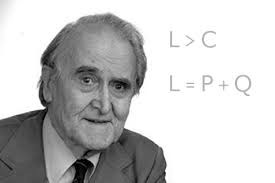
At the time, we thought that we knew what a doctorate was, based on “objective” led, traditional scientific method. Reg was talking about a “subjective” led, work based doctorate, and the acceptance of that by academics, as being equal to the so called “objective scientific research”. Of course, he was ahead of his time. In truth, my colleagues and I were not at the leading edge. We could not grasp how to apply his ideas. We were not alone. But, that was about to change.
Third Phase
One of my colleagues listened, and took action, on what Reg Revans said. It was Dr Gordon Wills, now Baron Prestoungrange, who at that time was Professor of Marketing at Cranfield. Three years later, in 1982, he left Cranfield, and with colleagues he established The International Management Centres Association, which adopted action learning, as its focus point for continuing professional development.
The Association’s major role was to provide member organizations and individuals, accredited quality standards and qualifications for their work-based action learning. Dr Reg Revans accepted the invitation to become the inaugural President of the International Management Centres Association.
The Association bought an “olde worlde” type of property in the country town of Buckingham, as its office. I can remember Reg visiting on a beautiful English summer’s day, and speaking in the garden, to a group. Reg took the opportunity to say what he hoped would happen in the Association. He shared his action learning ideals. He exhorted us to join in the action, at grass roots level, to improve things, and not stand on the sidelines giving lectures, or being critical of those who were on the pitch, doing their best.
That was the nature of his presidency. He would attend the annual Congregation, whenever he could, wearing his President’s robes with pride, and offering his wise words of counsel. Farsighted and wise words, they were. Then, he would slip away, as quietly as he had arrived. No fanfares or special requests, and often travelling on public transport. He rarely accepted an offer of a ride in someone’s car, and as to my recollection, he never drove a car during the time I knew him.
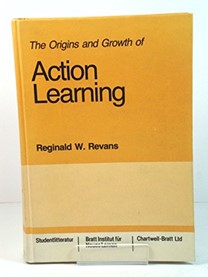 By chance, I met Reg again, this time on a train, in London. He had been to his publishers, Chartwell-Bratt, to agree on the final version, of his opus, The Origins and Growth of Action Learning, which was published in 1984. He again, outlined the value of the action learning approach, and I realized I should be more active. What Reg Revans was saying, added up. Managers were saying they wanted learning that related to their action and experience, albeit, they did not have a name or political process, or structure, to make it work.
By chance, I met Reg again, this time on a train, in London. He had been to his publishers, Chartwell-Bratt, to agree on the final version, of his opus, The Origins and Growth of Action Learning, which was published in 1984. He again, outlined the value of the action learning approach, and I realized I should be more active. What Reg Revans was saying, added up. Managers were saying they wanted learning that related to their action and experience, albeit, they did not have a name or political process, or structure, to make it work.
I was, at that time, an editor of management journals, and also a director and shareholder of the MCB University Press publishing company, now named Emerald Publishing. We learned how to become publishers, and directors of a business and also editors, by sharing and comparing, though we did not call it action learning. I invited Reg Revans to publish his work in the journals. When I asked him to contribute, he always gave me the impression that he was pleased someone was interested, and keen to publish his ideas and work, rather than seeing it as a chore. Indeed, the organization later published a full monograph of articles by him. His writing covered fascinating issues and cases. However, in my view, he was more influential when speaking to others, often in a lecture type situation.
Fourth Phase
I immigrated to Brisbane, Australia, in 1982. After I had been there a couple of years, I invited Reg to speak at a conference, and meet with Australian professionals and managers, who were interested in his ideas. He was at that time, in his mid 70s, but he accepted the invitation.
I remember receiving a phone call, on a Sunday morning, from the University of Queensland duty officer saying there was a Dr Revans at the airport waiting for me. I had been told that he would arrive the next day. I rushed to the airport, and found Reg, who had been waiting about four hours, after a long 30 hours of travel time. He was having a cup of coffee and, in a jet-lagged state, had spilt some on his suit. My wife offered to take it to the dry cleaning shop the following day. He said it would be no problem, as he had been brought up to be self-sufficient, and that he would get the stain out when he got to his hotel.
During the next week or so, he gave a brilliant series of workshops. I can see him now, talking with a group in the sunshine, on a crystal clear Australian afternoon. As it was hot, we decided to have the meeting outside. The group sat under the shade of a tree, while Reg gave forth, in Old Testament fashion, for he was without doubt, a prophet. During the meeting, he said something that has always stayed with me. “Remember”, he said, “the measure of a person, is not in the statements he or she makes, but in the questions they ask”.

So, it was with Reg. He would expect you to ask questions about your work; your team; your life; your relationships; your career; and so on. Yet, he did more than ask questions, for he had strong opinions. He felt that too much money was wasted on non-work-based training. He had no time for managers climbing ropes, or trekking up mountains, or other such outdoor activities. Nor did he have time for Harvard type case studies, which he regarded, as a review of someone else’s history, in a time and space not relevant to the current issues.
His focus was on the present, and the live problems and issues that need resolving, so we can get cleaner water, better health provision, and more jobs so people can feed their families. He wanted everyone, at all levels, to study their own job. It was a simple idea, but hard for many to do. He said that, by asking questions and getting feedback to shape our responses, we could all improve our performance.
Fifth Phase
Subsequently, I met him on a number of other occasions at International Management Centres Association functions, such as the annual Congregation. He was always delighted to see people applying action learning, and gaining recognition for their achievements.
He would usually give a short address, during which he would make the point that they had not finished, but only just started. In particular, he encouraged those attending to involve others in the action learning process. I am always surprised, and disappointed, that so many people who benefited from his action learning principles did not heed his call, and develop similar experiences for their own team members and colleagues.
Revans continued to travel, and spread the action learning word well into his 80s. He also made a video for the International Management Centres Association, in which he articulated his models of the tasks, the situations and the development needs of each person. He stressed that for managers to learn, they needed to gain experience in either, or both, new tasks and new situations. He also discussed what managers can do when confronted with “on the precipice of disaster” problems, where old textbooks and old solutions are not relevant. Of course, he suggested that they adopt a practical approach based on action learning.
He also stressed that action learning needed to live in the work place, and not be constrained by artificial boundaries. In that sense, he wanted the Association to be an open and inclusive and facilitative organization, not limited like other organizations by quotas of entry, or restrictive rules. He encouraged flexible arrangements, which have been adopted, to support those in all countries that wanted to participate. Action learning, as he indicated, is not just for the rich, but also for those who want to improve.
Reg Revans’ Style
 Reg Revans was a modest man in terms of his approach to business, and style of life. As far as I know, he never tried to establish a business, or make money out of action learning. Indeed, he was suspicious of those that did. Also, he was reluctant to institutionalize his ideas, as he wanted to challenge the status quo. Continual improvement was his creed. In that sense, he was a truly a peaceful revolutionary. He had strong values for personal and professional development tied to organizational improvement. His revolution was to encourage people to take responsibility for their own learning and development, making the best of their talents, and to assist others through mutual support.
Reg Revans was a modest man in terms of his approach to business, and style of life. As far as I know, he never tried to establish a business, or make money out of action learning. Indeed, he was suspicious of those that did. Also, he was reluctant to institutionalize his ideas, as he wanted to challenge the status quo. Continual improvement was his creed. In that sense, he was a truly a peaceful revolutionary. He had strong values for personal and professional development tied to organizational improvement. His revolution was to encourage people to take responsibility for their own learning and development, making the best of their talents, and to assist others through mutual support.
He did not want followers, but rather for each person to be their own leader contributing to improvement at all levels. Management education was not just for managers, and people in power. It was too important for that narrow elitist view that has dominated so much of the arrangements. Action learning was for all, including the unemployed, such as those at Wolverhampton, who he encouraged to meet in order to assist each other find work.
He was a fund of knowledge in many fields. When he talked, people listened. This was a man who knew what he was talking about. He ranged over many subjects with ease, understanding and conviction. He called upon the scriptures, in the widest sense for he understood many Faiths, plus his deep knowledge of philosophy, psychology, mathematics, engineering, science and history.
At another level, his memory was incredible. I remember being with him at a conference in the United Arab Emirates, where he was the lead speaker on management development, citing his work in Egypt as part of his experience in the region. He was asked for names of people who were applying action learning. He not only gave the names, but also reeled off their phone numbers and addresses, without reference to any notes.
Reg Revans’ Beliefs
Reg Revans believed in the ordinary person, and their factory floor/ office work, experience and streetwise knowledge. He was a critic of traditional business schools, their restricted entry, and their passive learning style divorced from the real place of work. He was a populist, without a big organization or army of people supporting him.
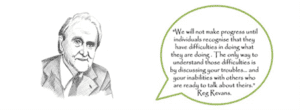
He had many great sayings, which summed up his approach. For example, he said that for an organization to engage in positive action and learning that there must be, “the upward communication of doubt”. That summed up his democratic ideals, in contrast to bureaucracies that often reflected the downward communication of order.
He also advocated that everyone should “learn with and from each other”. Learning was a mutual thing, not just a solitary endeavour. It needed to be based on experience, and respect for the other person’s ignorance and curiosity, in the face of real problems and opportunities, plus their questions, and need to understand. You can read many of his inspirational quotations further along.
Summary
He said that learning is for everyone, not just those fortunate enough to get into colleges and universities. Open the doors and make them wider, was his message. Bring people together who share problems, and care about getting great solutions. That was his starting point, but not the finishing line. The task was a continuing one of encouraging people to understand their experience, and ideas by both qualitative and quantitative methods, and to share their learning with others.
That was the message of Reg Revans. As far as I know, he never received a Royal award, or other similar honour. Yet, his contribution to his country, and the world, has been many times greater than so many who have been recognized. It was a pleasure, and honour, to know him, and to learn what action learning can do. I have benefited considerably in both my work and life.
About The Author
 Dr Charles Margerison, President and founder of Amazing People Worldwide, is a Psychologist. He is also President of Amazing People Schools. Dr Margerison has consulted widely for major organizations in the fields of organizational and educational psychology. He was previously Professor of Management at Cranfield University, UK, and the University of Queensland, Australia. He founded Amazing People Worldwide in 2006 and is supported by a dedicated global team. He previously co-founded Emerald Publications, and Team Management Systems and has authored more than 30 books. He has created the Amazing Career Achievers Library, which records the life stories of amazing people. Dr Charles is also the creator of ‘Can Do Kids Band’, a virtual music group that helps students to learn about countries and cultures through music. He has also developed Imagineland, for early learners. You can follow him on Linked in .
Dr Charles Margerison, President and founder of Amazing People Worldwide, is a Psychologist. He is also President of Amazing People Schools. Dr Margerison has consulted widely for major organizations in the fields of organizational and educational psychology. He was previously Professor of Management at Cranfield University, UK, and the University of Queensland, Australia. He founded Amazing People Worldwide in 2006 and is supported by a dedicated global team. He previously co-founded Emerald Publications, and Team Management Systems and has authored more than 30 books. He has created the Amazing Career Achievers Library, which records the life stories of amazing people. Dr Charles is also the creator of ‘Can Do Kids Band’, a virtual music group that helps students to learn about countries and cultures through music. He has also developed Imagineland, for early learners. You can follow him on Linked in .
For more information, please email info@amazingpeopleworldwide.com
Websites:
